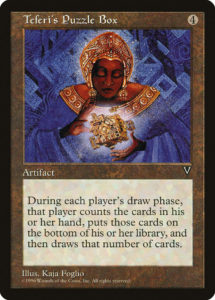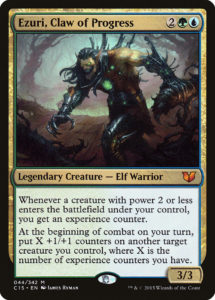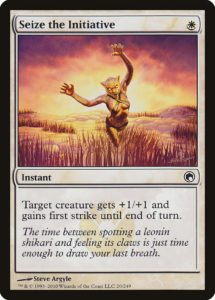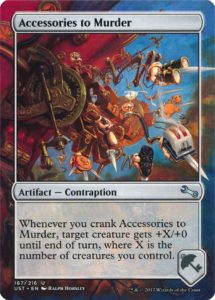Games can have incredible moments where something sears itself into memory, when a story is born for you to tell time and again. These can be triumphant victories, incredible comebacks, devastating losses, or just wildly ridiculous game states. As human beings, we naturally seek out stories to tell, and games are fertile fields for fables.
These moments tend to happen when you’re already well-versed in a game. This makes sense—you need to understand a game well enough to appreciate a special occasion, and need to be sufficiently invested in order to care that something wondrous happened. These moments can serve as strong hooks to entice someone into embracing a game, but them being often gated behind enfranchisement renders some games more inaccessible. Last week, we discussed Magic’s biggest weakness—that it’s difficult to teach. Today, we’ll consider a consequence of this: Magic’s great moments are less accessible to newer players and this makes the game less accessible. What can we do to make Magic’s dynamic gameplay more understandable and thus, enticing?
The Problem of Abstraction
Magic isn’t alone in being difficult for a non-enfranchised player to appreciate. Many board games have this issue. However, Magic has it a bit harder because both its mechanics and narrative are highly abstracted. To define our term, a game component is abstracted if it doesn’t closely resemble or heavily simplifies the thing it represents. Let’s provide a few examples:
Pandemic is a game with abstract mechanics (you’re collecting cards and removing cubes that represent outbreaks of disease), but it has a clear narrative (you’re saving the world from said diseases).
Starcraft multiplayer has an abstract narrative (you’re a military commander, which is a clear narrative, but the gameplay makes no sense in the context of the single player campaign’s strong narrative. Why would Zerg ally with Protoss against a team of Zerg and Terrans?), but has clear mechanics (you give troops orders which they follow, they fight in ways you’d expect, and your verbs are commanding and not shooting).
Chess has both an abstract narrative (you’re a military commander controlling abstract representations of units on an abstract board) and abstract mechanics (the pieces don’t really act like soldiers would and combat is heavily simplified).
Magic is a highly abstracted mage’s duel, fought with cards that represent spells and conjured creatures. The cards have a lot of flavor, but the story of the gameplay is quite different—you never experience the act of planeswalking, even though both players are ostensibly planeswalkers (you only see that aspect of the game through calling upon creatures from a variety of worlds). Unlike in Pandemic, it’s not clear why you’re dueling in Magic or what’s at stake. Chess shares these issues, but since it is based in historical medieval warfare rather than a fantasy world, it’s a bit easier to describe and comprehend (even if such comprehension isn’t necessary to play the game). I don’t dispute that Magic has strong narrative hooks, but those are harder to appreciate through its gameplay, given that the artwork and flavor text that do most of that work don’t come into play. This combines with how numerical and abstract Magic’s gameplay is—the steps of combat damage abstract how fighting works and looks so that it’s not apparent to an outsider what is happening and why.
The Value of Experience
Abstraction isn’t a bad thing by any means. Ultimately, every game has to put the spotlight on some things and ignore others as well as simplify its themes so that they can be mechanically represented. However, abstraction can make things harder to recognize, particularly when the way you describe something in game terms doesn’t sound like the way it happens in real life. When first introducing a new game, it’s smart to cut through that abstraction and have the experience tell a clear, coherent story (even if it glosses over much of how the game work).
So, story time. I spent all of last week at Gen Con. I lead Kingdom Death’s demo team and design our demos, so I spend a lot of time thinking about how to present games in the best way possible. The experience was, as always, joyous—I had a ton of pride in my coworker’s excellent performances, got to meet a whole bunch of enthusiasts for our work, and yeah, it was a ton of fun running the demos myself. As I worked, I wondered how one could take the things that work well in our demos and apply those principles to Magic.
Kingdom Death: Monster has two big advantages over Magic: the Gathering. The first is that the game is narratively clearer. KD:M both of miniatures to more directly represent what is happening in the game and its gameplay is visceral and easily understood: it’s a kill-or-be-killed fight against a giant monster. That’s an easier elevator pitch than “you’re engaged in a wizard’s duel across the universe… which you won’t really see happen as you play. You fight mostly by summoning an army to your side. …the army is actually imagined, but, you know what, nevermind.” This narrative difficulty is much of the reason why named Planeswalkers have become the face of Magic rather than the faceless player, and I’d wager it’s some part of the reason why Commander is so popular (it’s easier to connect with a deck that represents a particular character fighting other particular characters than it is a faceless, context-less conflict). This narrative advantage is baked into KD:M and isn’t quite as easy to port over to Magic demos. However, our second advantage is something I can see Magic using in demos.
Tell a Great Short Story
In our demos at Gen Con, we always start in media res, right at the climax of the fight. The chips are down and the players desperately need to turn things around before they’re all slaughtered. Starting in the middle is common in cinema, literature, and video games, as it immediately provides stakes and hooks the players into the moment (despite the fact that it glosses over the game systems or narrative setup that underpin the moment).
However, most board game demos start at the beginning—this is good for showing people the basics of playing, but it’s generally bad at providing the exciting moments that give players a reason to play. Doing it this way makes a ton of sense, since the foundational mechanics like playing lands and casting spells set the stage for understanding what is happening. This avoid over-complication, but leading with simple, abstracted mechanical actions can be both dull and hard to understand. (Heck, I still don’t fully appreciate what’s mechanically happening or exciting about drawing mana from lands, and I’ve been playing Magic for 25 years.)
So, is there a way you could skip to the exciting part of a game of Magic? Just plopping someone into a game on turn six, where both players have a bunch of permanents on the battlefield and cards in hand, is likely to be overwhelming. It’s hard enough teaching the basics of mana, lands, tapping and untapping, casting and paying for spells, but doing that when someone also has to parse fifteen cards and learn how to do combat is engaging with extreme cognitive overload. You could go even farther and craft a bizarre late game state where a series of board wipes have left players with ample mana resources but nothing else in play, little in hand, and no lands left in deck. This can let players skip right to the cool part of Magic (casting spells and using creatures), but it glosses over some of the essential steps to learning the game (how lands work, the slow buildup over the first few turns, the excitement of watching your hand play out). I’m curious whether this technique would work, be more confusing than current method, or provide false impressions of what the experience of playing Magic is like, or how much Wizards has experimented with this.
Telling Stories in Other Ways
One of the many reasons that MTG Arena is so successful is its ability to communicate action. It creates impact via audiovisual moments—when you play a mythic rare, or most rare creatures, or use a keyworded ability, the game communicates the gravity of the moment with sound and animation. When a particularly large creature attacks, you hear and see the weight of its fury as it slams into a blocker or the opposing player. When a Planeswalker uses an ability, you hear and see their magic and personality at work. These help to cut through some of the abstraction inherent in Magic. They also set the stage for better Magic tutorials, where clearer board states with clearer narratives can help show not only how Magic works, but why the game is awesome. I’m excited to see not only further developments in digital tutorialization for Magic, but how Magic can continue to experiment with its tabletop presentation. I’ll be giving it a go in my own time and maybe hit on something new and interesting. Only time will tell.
And, as always, thanks for reading.
—Zachary Barash is a New York City-based game designer and the commissioner of Team Draft League. He designs for Kingdom Death: Monster, has a Game Design MFA from the NYU Game Center, and does freelance game design. When the stars align, he streams Magic (but the stars align way less often than he’d like).
His favorite card of the month is Ill-Gotten Inheritance. It’s not often that you can staple two generally bad effects together and get something powerful, but this unassuming enchantment managed to create an exciting whole out of underwhelming parts. Moreover, it subtly engaged with two very different guilds’ themes while enabling both aggressive and defensive strategies. That’s a lot of work for a pretty straightforward common.





